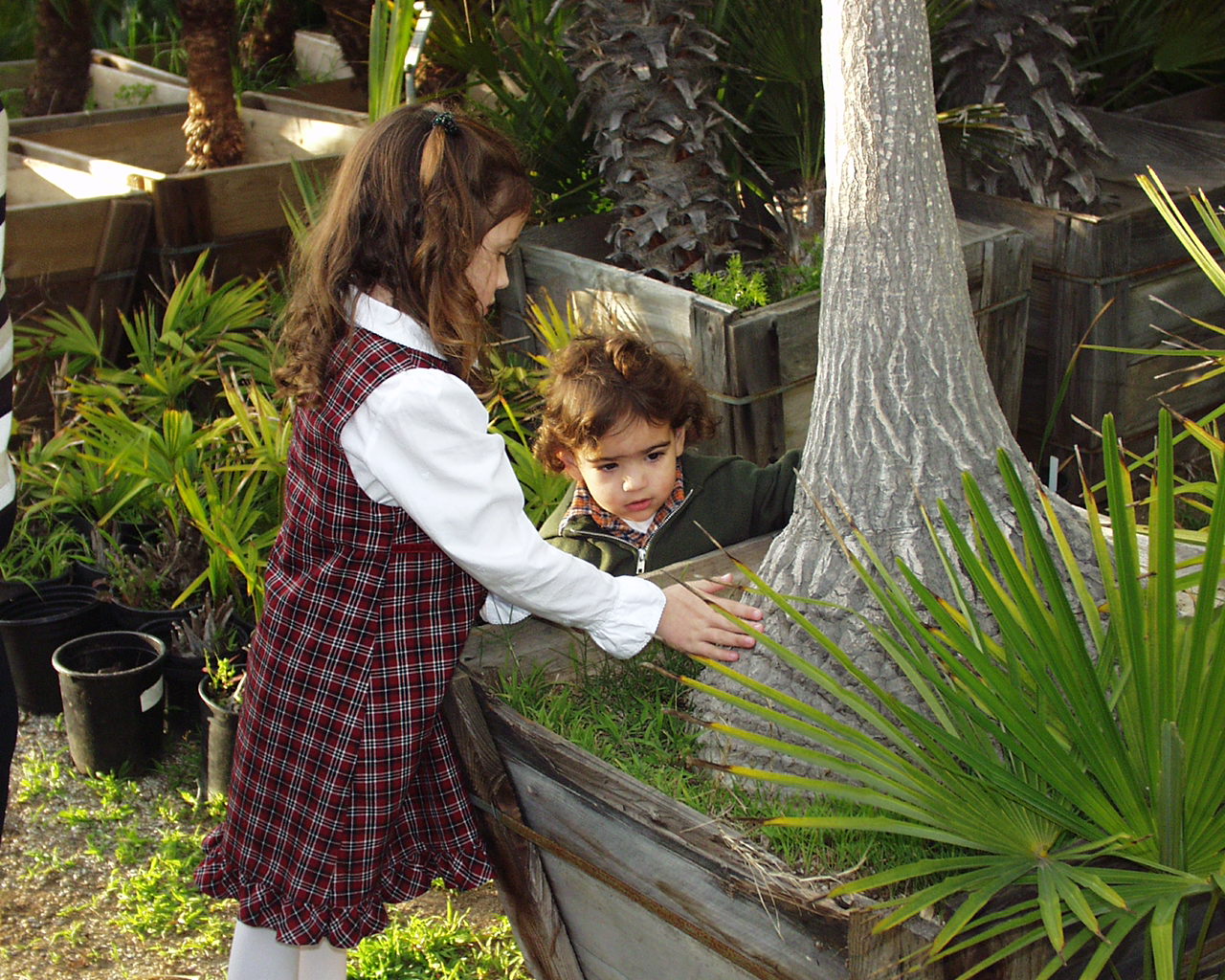By
Donald H. Harrison
In honor of the approaching Tu B'Shevat holiday, Heritage assistant
editor Gail Umeham and I, with our respective spouses Okoronkwo and Nancy,
decided to take our grandchildren Amy, 4 1/2, and Shor, 20 months, to visit
City Farmers Nursery to learn about trees and other plant life.
Bill Tall, owner of the nursery, grew up at Congregation
Beth El back in the Conservative congregation's Clairemont days. Today, he
is a member of Temple
Beth Sholom in Chula Vista.
 |
He cherishes days like Tu B'Shevat when his passion for growing
and his religion come together. His daughter, Rebecca, today a business
student at San
Diego State University, and his son, Samuel, a Crawford High School
student, became b'nai mitzvah with ceremonies right at the nursery, amid the
trees, shrubs, farm animals and fish. A similar experience may await daughter
Sarah, now a student at Horace Mann Junior High School.
Tall also enjoys teaching children about plants, possibly realizing that the
adults who accompany the children to |
| Shor and Ami examine elephant
palm |
the nursery will hang onto his every word, because they donąt know much
about horticulture either. Tall is a natural teacher.
Do you know why some trees shed their leaves in winter? Tall explained to us
that in cold climates the leaves fall on the land above the tree's root system,
thereby insulating the roots from freezing. Furthermore, the fallen leaves
provide nutrients for the roots, enabling them to force food back up into the
plant system.
I'm not sure how much of that either little Amy Lupsha or Shor Masori absorbed.
However, while Tall educated the grandparents, he also kept the tykes
interested.
At one point, he broke off a piece of sugar cane, stripped it, and instructed
Shor to put it in his mouth so he could see how sweet it tasted. Shor chewed and
sucked it for the rest of the tour, and only relinquished the cane afterwards
when we stopped at Nate's Deli, which the Tall family also operates on the
property at 4382 Home Ave. The deli is named for Bill's late father.
For Shor, sugar cane was good, but the deli's chocolate chip cookie, accompanied
by a glass of milk, proved even tastier!
During the tour, Amy seemed fascinated by an elephant-foot palm, so named
because the bottom of the palm looks like an elephant's foot. "If you ever
felt an elephantąs foot, this is what it would feel like," Tall told Amy.
I couldnąt make up my mind if that were true or just a Tall tale.
As Amy inspected the tree more closely, the nursery man told us elephant-foot
palms had been planted as "street trees" in Los Angeles, but "they
grew so wide that they grew over the curb and into the street and became a
nuisance."
It was apparent to me that Amy has a fondness for animals, whether of the "elephant"
palm variety or of the barnyard variety such as the sheep, goats, horse, ducks,
turkey, geese, chickens and roosters that the Tall family keeps in an outdoor
menagerie. When Shor started to put his fingers through the fence to pet the
animals, Amy was quick to protect him from such folly.
Tall told fascinating stories about some of the strategies that Mother Nature
employs to ensure that trees are able to reproduce. Fruit, for example, is a
device to protect the seed that is maturing inside. When the fruit falls off the
tree in the summer, either on its own or with the help
of birds, the fleshy material around the seed rots away. However, the seed still
is protected from the ensuing cold climate by a seed coat, or pit.
During the winter, the coat will begin to weaken. Next, in the spring, it will
break down sufficiently to permit the seed to come out and germinate.
Another strategy employs insects, Tall said. Caterpillars will defoliate a
passion-flower shrub completely, and when there is no food left, they will go
into their cocoons. Mother Nature requires the plants to suffer such marauders
because later in the cycle, when the passion flowers come out, butterflies will
emerge from the cocoons and begin their work of pollinating
the flowers. Of course, pollinating the flowers is essential to the production
of seeds.
"The sole reason a plant is on the Earth is to reproduce," Tall
instructed. I figure if his parents don't tell him first, Shor and I will have a
variant on the birds-and-the-caterpillars conversation some years from now. |

